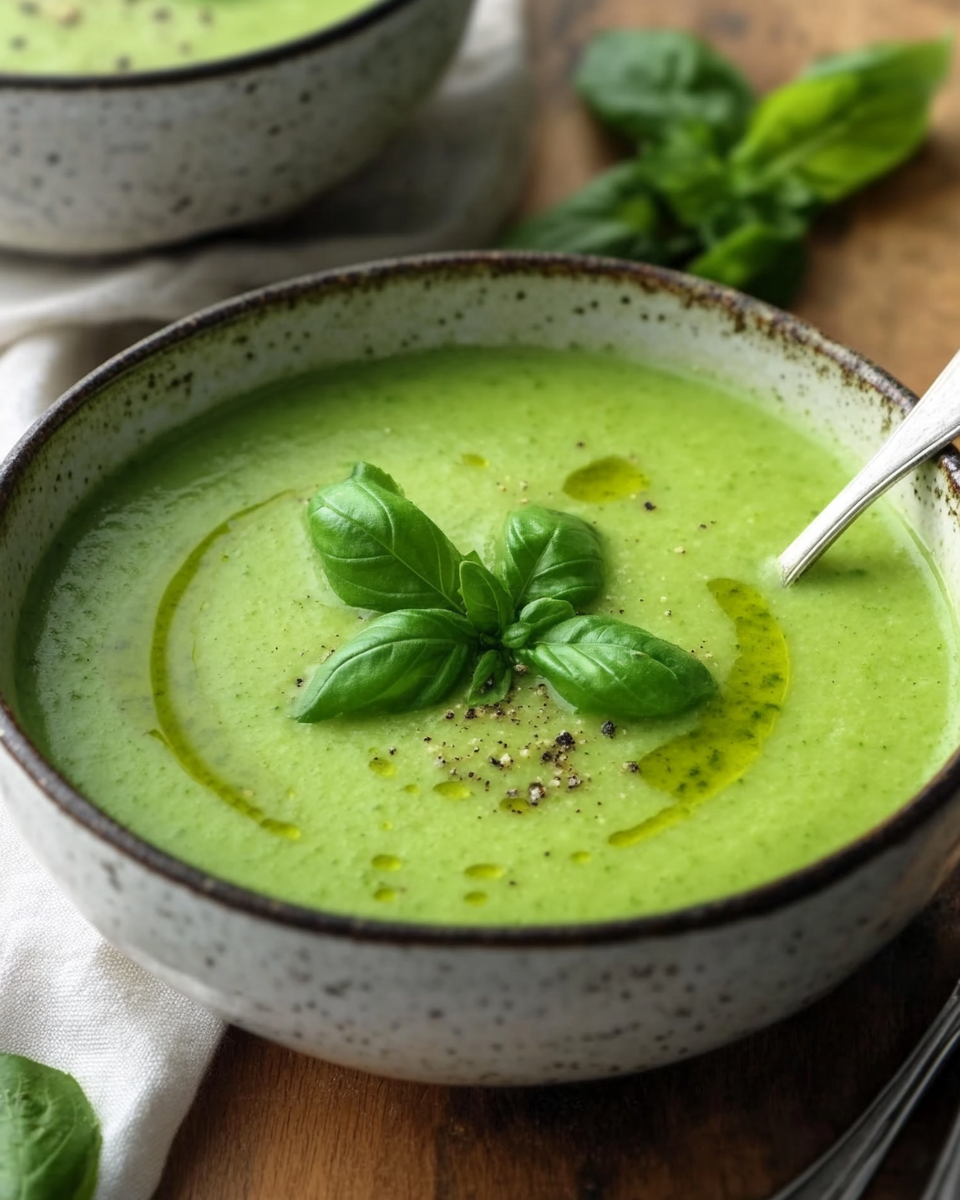A light and flavorful soup that’s perfect for summer, this Zucchini Basil Soup combines tender zucchini with fresh basil and a touch of garlic for a refreshing, creamy texture—without any cream. Ideal as a starter or light meal, it’s both healthy and comforting.
FULL RECIPE
Ingredients
- 2 tablespoons olive oil
- 1 medium onion, chopped
- 2 cloves garlic, minced
- 4 medium zucchinis, sliced
- 3 cups low-sodium vegetable broth
- 1/2 teaspoon salt (adjust to taste)
- 1/4 teaspoon black pepper
- 1/2 cup fresh basil leaves
- Optional: 1 tablespoon lemon juice (for brightness)
- Optional: 1/4 cup plain Greek yogurt or coconut milk (for creaminess)
Directions
- Heat olive oil in a large pot over medium heat. Add chopped onion and sauté for 5 minutes until soft.
- Add garlic and cook for another 1 minute, stirring frequently.
- Add sliced zucchini and cook for 5-7 minutes until tender.
- Pour in the vegetable broth, salt, and pepper. Bring to a boil, then reduce heat and simmer for 10-15 minutes.
- Remove from heat. Add fresh basil and optional lemon juice.
- Use an immersion blender to puree the soup until smooth. Alternatively, carefully transfer in batches to a blender.
- Return to heat and stir in Greek yogurt or coconut milk if using. Heat through but do not boil.
- Serve hot, garnished with extra basil or a swirl of yogurt.
Nutritional Information
- Calories: 110
- Total Fat: 7g
- Saturated Fat: 1g
- Cholesterol: 0mg
- Sodium: 380mg
- Total Carbohydrates: 10g
- Dietary Fiber: 2g
- Sugars: 5g
- Protein: 3g
- Vitamin A: 15% DV
- Vitamin C: 35% DV
- Calcium: 4% DV
- Iron: 6% DV
Health Benefits of Zucchini Basil Soup
Zucchini Basil Soup is not only delicious but also packed with nutrients that promote overall health. Zucchini is low in calories but high in essential vitamins such as vitamin C and A, which support immune function and skin health. Basil adds antioxidants and anti-inflammatory properties that can help protect the body from chronic diseases. Combined, these ingredients create a nourishing soup that supports digestion, boosts immunity, and provides hydration thanks to zucchini’s high water content.
Why Zucchini is Ideal for Soups
Zucchini’s mild flavor and soft texture make it an excellent base for soups. When cooked, zucchini breaks down easily, creating a smooth and creamy consistency without the need for added dairy or heavy cream. This makes the soup lighter and easier to digest. Additionally, zucchini absorbs flavors well, allowing the garlic, basil, and broth to shine through, creating a balanced and fresh taste.
The Role of Fresh Basil in Flavor Enhancement
Fresh basil is a key ingredient in this soup that elevates its flavor profile. Unlike dried herbs, fresh basil offers a vibrant aroma and a slightly sweet, peppery taste that complements the zucchini’s subtle sweetness. The herb also contains essential oils that release flavor when blended into the soup, making each spoonful fragrant and refreshing. Basil’s bright green color also adds visual appeal to the dish.
How to Make Zucchini Basil Soup Creamy Without Dairy
One of the best features of this recipe is its naturally creamy texture achieved without heavy cream or milk. By pureeing the cooked zucchini and broth, the soup attains a silky, velvety consistency. For those who want a little extra richness, a dollop of Greek yogurt or coconut milk can be added at the end. This keeps the soup light but creamy and suitable for various dietary preferences, including dairy-free or vegan adaptations.
Seasonal Variations and Ingredient Substitutions
This soup is incredibly versatile and can be adapted to suit different seasons and tastes. In cooler months, adding a pinch of warming spices like nutmeg or smoked paprika can add depth. For a heartier version, tossing in some cooked potatoes or white beans can increase the protein and fiber content. If fresh basil is unavailable, other herbs like parsley, cilantro, or mint can provide an interesting twist while maintaining freshness.
Pairing Suggestions for a Complete Meal
Zucchini Basil Soup works wonderfully as an appetizer or a light lunch. Pair it with crusty whole grain bread or a simple side salad for a satisfying meal. For a more substantial dinner, it can accompany grilled chicken, fish, or roasted vegetables. Its lightness balances well with richer or more robust dishes, making it a versatile choice for various menus and occasions.
The Soup’s Role in Weight Management
Because it is low in calories and fat but rich in fiber and water content, Zucchini Basil Soup is an excellent choice for those aiming to manage their weight. The fiber helps increase feelings of fullness, reducing overeating, while the soup’s hydration supports metabolism. Its nutrient density ensures you get vitamins and minerals without excess calories, making it a smart option for health-conscious individuals.
Tips for Selecting and Preparing Zucchini
When choosing zucchini for soup, look for firm, medium-sized zucchinis with glossy, unblemished skin. Smaller zucchinis tend to be sweeter and less watery than larger ones, which can sometimes have a more bitter taste. Wash thoroughly and slice evenly to ensure uniform cooking. Overcooking zucchini can cause it to lose flavor, so it’s best to sauté lightly before simmering to preserve its taste and texture.
Storage and Reheating Best Practices
Zucchini Basil Soup can be stored easily in the refrigerator for up to three days, making it a convenient meal prep option. To maintain its fresh flavor and texture, store in an airtight container and reheat gently on the stovetop over low heat. Avoid boiling it again, as this can dull the bright basil flavor. For longer storage, the soup freezes well; just thaw overnight in the fridge and reheat slowly before serving.
The Soup’s Place in Plant-Based and Vegan Diets
This soup is naturally plant-based and can easily fit into vegan diets by skipping the optional dairy additions or substituting with coconut milk or other plant-based creams. Its wholesome ingredients provide essential nutrients that support vegan nutrition, such as vitamins, minerals, and antioxidants. It is a perfect example of how simple vegetables and herbs can create a delicious, comforting dish without animal products.
Cultural and Culinary Origins of Zucchini Soup
Zucchini soups have roots in Mediterranean and Italian cooking, where zucchini and fresh herbs are staples. These regions emphasize fresh, seasonal ingredients prepared simply to highlight natural flavors. The use of basil also ties the recipe to Italian cuisine, known for its vibrant herb usage. This soup reflects the Mediterranean diet’s principles of balance, freshness, and healthfulness, which have been linked to longevity and reduced chronic disease risk.
Environmental Impact and Sustainability
Zucchini is a highly sustainable vegetable to grow, requiring relatively little water and maturing quickly, which makes it an environmentally friendly choice. Using fresh herbs like basil from local or home gardens further reduces the carbon footprint of this dish. Choosing plant-based recipes such as this soup contributes to lower greenhouse gas emissions compared to meat-heavy meals, aligning with eco-conscious eating trends.
Conclusion
Zucchini Basil Soup is a nourishing, versatile, and delicious option that fits perfectly into healthy lifestyles and diverse dietary needs. Its simple ingredients deliver impressive nutritional benefits, while the fresh flavors provide a refreshing culinary experience. Whether served as a starter or a light meal, this soup offers ease of preparation, adaptability, and a touch of Mediterranean charm that makes it a standout in any kitchen.






